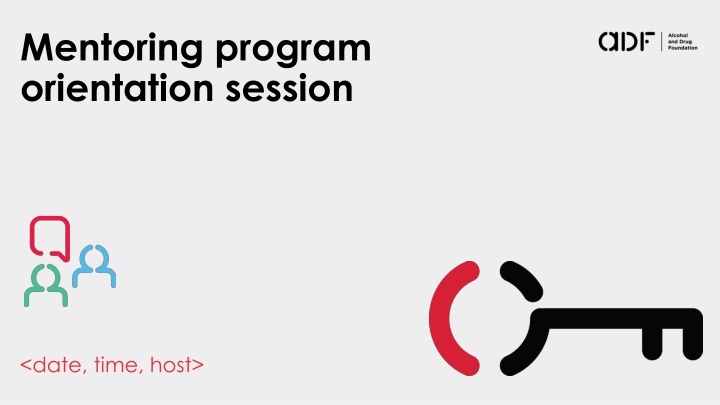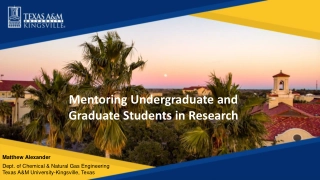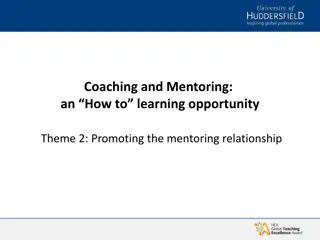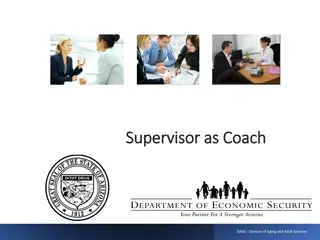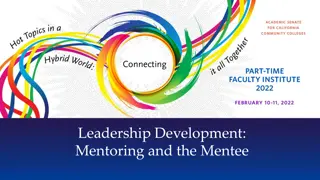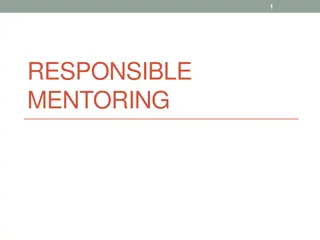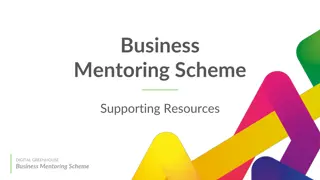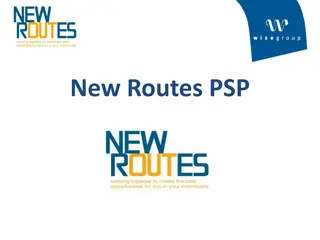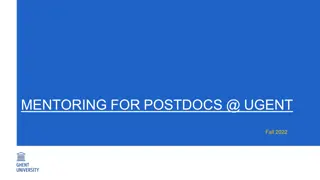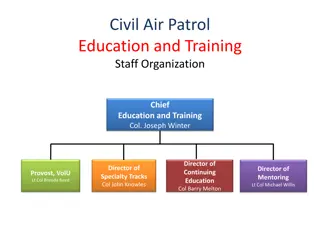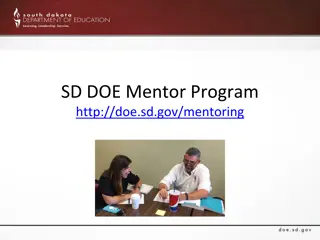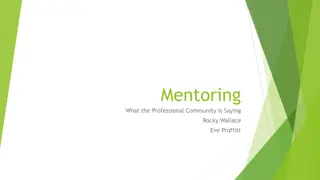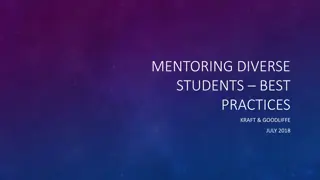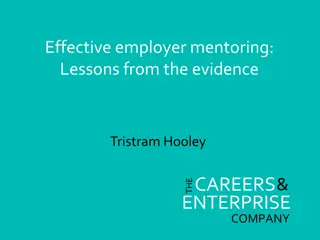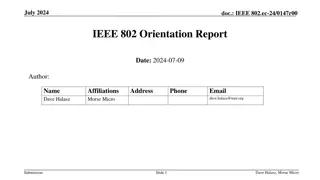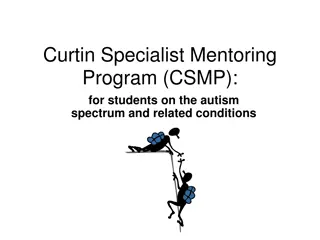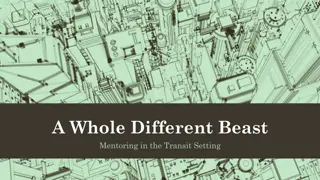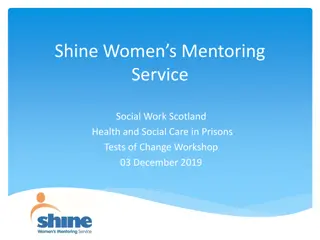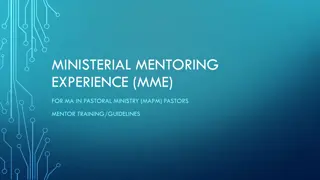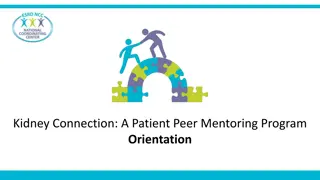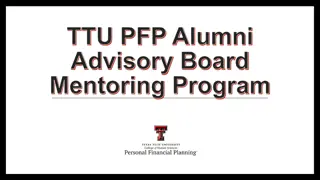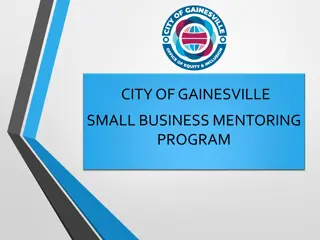Comprehensive Mentoring Program Orientation Session Overview
This mentoring program orientation session provides an in-depth overview of the objectives, structure, and benefits of mentoring. The session covers introductions, roles and responsibilities, effective mentoring practices, and the core values of the program. Mentoring aims to establish purposeful relationships to support young individuals with guidance, encouragement, and skill development. Through this program, young people are connected with caring mentors to prevent or delay the use of alcohol and other substances. The session emphasizes promoting welfare, safety, integrity, justice, and respect for all participants.
Download Presentation

Please find below an Image/Link to download the presentation.
The content on the website is provided AS IS for your information and personal use only. It may not be sold, licensed, or shared on other websites without obtaining consent from the author.If you encounter any issues during the download, it is possible that the publisher has removed the file from their server.
You are allowed to download the files provided on this website for personal or commercial use, subject to the condition that they are used lawfully. All files are the property of their respective owners.
The content on the website is provided AS IS for your information and personal use only. It may not be sold, licensed, or shared on other websites without obtaining consent from the author.
E N D
Presentation Transcript
Mentoring program orientation session <date, time, host>
Acknowledgement of Country I would like to begin by acknowledging the <insert name of people here (e.g. Ngunnawal)> people, Traditional Custodians of the land on which we <gather/meet> today, and pay my respects to their Elders past and present. I extend that respect to Aboriginal and Torres Strait Islander peoples here today. ALCOHOL AND DRUG FOUNDATION 21/09/2024
Session overview 1. Introductions and welcome 2. Introduction to mentoring 3. Mentoring program overview 4. Roles and responsibilities 5. Effective mentoring ALCOHOL AND DRUG FOUNDATION 21/09/2024
Mentoring aims to provide a purposeful, structured and trusting relationship, that brings young people together with caring individuals who offer guidance, support and encouragement. New Zealand Youth Mentoring Network ALCOHOL AND DRUG FOUNDATION 21/09/2024
Benefits of mentoring Community Young people (mentees) Mentors Organisations ALCOHOL AND DRUG FOUNDATION 21/09/2024
Mentoring program overview Vision: Mission: Young people are supported to live healthy and fulfilling lives unlimited by alcohol and drug harm. Connect young people with caring and responsible adults in order to build their knowledge, skills and wellbeing and prevent and/or delay the use of alcohol and other drugs. ALCOHOL AND DRUG FOUNDATION 21/09/2024
Mentoring program overview Values: promote the welfare and safety of the young person be trustworthy and responsible act with integrity promote justice for young people respect the young person s rights and dignity honour the young person and family voice in designing and delivering services strive for equity, cultural responsiveness and positive social change ALCOHOL AND DRUG FOUNDATION 21/09/2024
Mentoring program overview <LDATs to provide details relating to the scope of their mentoring program> ALCOHOL AND DRUG FOUNDATION 21/09/2024
Who can be a mentor or mentee? Mentors are mature people aged over 18 years who want to assist young people to develop their potential. Mentees are young people who want to gain from the encouragement, experience and expertise of an older person. ALCOHOL AND DRUG FOUNDATION 21/09/2024
Code of Conduct - mentors What are the key roles and responsibilities of mentors? What are some of the things that mentors must do/must not do? ALCOHOL AND DRUG FOUNDATION 21/09/2024
Code of Conduct - mentees What are the key roles and responsibilities of mentees? What are some of the things that mentees must do/must not do? ALCOHOL AND DRUG FOUNDATION 21/09/2024
Role of the LDAT Oversee the design, delivery and monitoring of the mentoring program Communication with mentors, mentees, parents/carers and stakeholders Monitoring and support of the mentoring relationship Program reporting to ADF and others Promotion of the program Supervision of staff and volunteers ALCOHOL AND DRUG FOUNDATION 21/09/2024
Monitoring and support The LDAT will monitor the match to: ensure the mentor and young person are meeting regularly debrief regularly with mentors and mentees to provide support to both parties and to assist in monitoring progress assess the quality of the relationship and whether it is making progress toward its goals identify and help address any problem that might arise between the pair gain feedback regarding how program staff can better support the match. ALCOHOL AND DRUG FOUNDATION 21/09/2024
Effective mentoring The needs, interests and empowerment of young people are at the centre Based on evidence and supported by policies and procedures A relationship where the mentor is an equal, rather than a teacher Monitoring and support throughout Culture of two-way learning ALCOHOL AND DRUG FOUNDATION 21/09/2024
